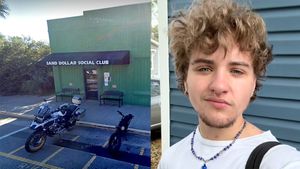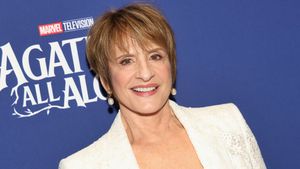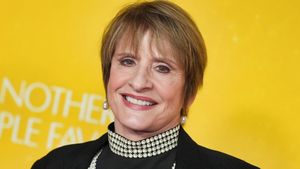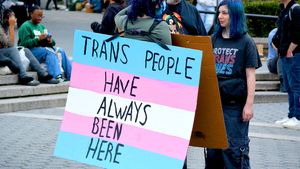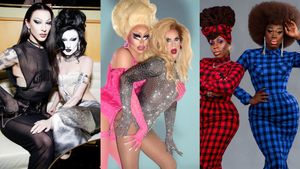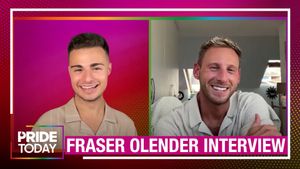Kristen McCallum has worked tirelessly over the last year to cultivate a brand and a community. The result? The SafeWordSociety, a podcast that's changing the way queer and trans people of color view themselves, their peers, and their paths to success.
Born out of a desire and a need to give QTPoC better representation, The SafeWordSociety Podcast focuses on living and thriving in New York City. Along with co-host Lamika Young, McCallum interviews creators and influencers within the QTPoC community to get their unique insights about what success looks and feels like to them. And podcast listeners from all over are lining up to get the scoop.
Along with producing the podcast, McCallum and the rest of the SafeWordSociety team are committed to engaging and collaborating with people in the QTPoC community. This year, the team is looking to expand its reach beyond the podcast. PRIDE chatted with McCallum about the brand and the podcast's fourth season which launched earlier this month:
PRIDE: Tell me a little bit about how The SafeWordSociety Podcast got started. What were your goals and intentions when you first came up with the idea for it?
Kristen McCallum: With a lot of wine and mistakes in my old living room in Harlem! My only goal at first was to have a space to decompress with my friends about being QTPoC living in NYC and trying to live our best lives. I had no idea what I was doing though. I didn’t even listen to podcasts back then. I was so determined though, so I spent about a week watching YouTube videos on editing and recording, ordered equipment, asked Lamika to trust me, and got busy. We recorded with two of our friends and I decided that if I published it I’d have to keep going (Virgos and quitting don’t mix). The rest is history.
PRIDE: Was there a particular incident or moment that made you say, “I need to make this podcast right now,” or did it just grow organically for you?
KM: Oh absolutely, there were a lot of little incidents. It had gotten to a point that I couldn’t sit through shows, movies, or even commercials without complaining about the lack of representation...I was pretty miserable. Then if there was a little representation it was super dramatic or completely unfulfilling. Like people, we have regular lives too. I honestly just wanted to see or hear about QTPoC in their everyday lives, no fluff. Where do they work? Where do they travel? What are they reading?
P: By and large, the podcast focuses on representation. How do you, as the host, make sure you’re amplifying voices that need and want to be heard? How do you select your interview subjects?
KM: I think a really important part of having any platform is being super intentional about the goal, and mine is 100 percent visibility. It makes it a lot easier to amplify a community when you genuinely love and appreciate them unconditionally. And I love the hell out of mine. Our guests are selected based off of my real life interest in who they are and what they do—that’s why the conversations are so organic! It’s really about meeting amazing people and sharing all of their goodness with the listeners!
P: Favorite interview you’ve done so far?
KM: Hands down, season 1, episode 8, talking about love and forgiveness with Anyanwu. I love all of the conversations we have on the podcast but the timing of Anyanwu’s was crucial for me. That episode changed me in a way I wasn’t expecting and it really secured the importance of this work for me. I was shifted and I won’t let her forget it. She’s a light and she still gets me together to this day! She spoke some words to my heart the other day and it helped me plan bigger goals for 2018. I’m telling you, life changer.
P: In conducting these interviews, what’s the most surprising thing you’ve learned—about yourself, other QTPoC, or the community as a whole?
KM: I’d have to say that I’m surprised every session by how much we all have in common. I am often left really shocked by guests because they are so transparent and vulnerable with us and we really connect. It’s been so affirming and I didn’t know this kind of community could exist for me until I sought it out. I’m always just really taken aback by that.
P: Season four of the podcast launched this month. What can listeners expect from the new season?
KM: Season 4...wow. Yes, we premiered on January 17 with Sir Knight of BlackTransTV! This season we’re talking to some more amazing folks. We’re going to discuss kink, sexual education, poetry, and so much more. Our host updates are even more personal this time around. We’re diving deeper in 2018!
P: What’s been your greatest challenge in creating and sharing this podcast? And what’s been the greatest reward so far?
KM: 2017 was a painful year for me and having to produce authentic content in the midst of that was so difficult at times. Lamika has thwarted many a breakdown and I’m so grateful to have her energy and dedication. It has helped immensely. My greatest reward has definitely been seeing the impact this platform has on the people that engage with it. I’m always so honored by the kind words and feedback we get because I didn’t plan for this kind of reach. So knowing that we are doing something so powerful makes me really proud.
P: Any plans to grow the brand beyond the podcast and its digital platform?
KM: YES! The podcast is our foundation and we’re definitely going to keep building that out, especially now that we’re streaming on Spotify, which is HUGE. This past June we produced our first event, a gender-neutral evening wear presentation for a QTPoC designer during New York Fashion Week! It was a great success and we are excited to share our production expertise with other brands/businesses that align with our mission, so we will be further expanding that focus. SafeWordSociety is pushing forward as the QTPOC visibility company committed to archiving the authentic narratives of queer Black and Brown folk and we’re going to do that in so many ways. Starting with a line of products in the first quarter of 2018 that will empower visibility discussions around the globe. Stay tuned!
P: Aside from the new season, what is 2018 going to look like for you and the rest of the SafeWordSociety team?
KM: The rest of the team...ahhh I have a team...that’s still weird to hear. 2018 is going to be BIG and I’m grateful to now have a team so that I can focus on our continued growth! We’ve started the new year with a complete refresh and new branding, we have an iFundWomen campaign starting in a few weeks to raise funding to launch our product line, compensate the team and all of the other costs associated with running a growing business. We’ve signed on as a community media outreach partner for a great initiative and we’re also going to get our celebration on because we’re turning 1 in February! All in all, it’s looking really busy and quite successful!
P: Lastly, the podcast focuses on thriving as a QTPoC. In your world and in your day-to-day, what does thriving look and feel like?
KM: Thriving these days is really about presence, gratitude and my ability to show up for myself no matter what. I’m pushing every day to be in a healthier head and heart space than the day before because that’s when I feel like I’m doing my best. If I’m resting, eating, loving, and laughing, I’m doing pretty damn good.
Be sure to visit SafeWordSociety.com for more information about Kristen, the podcast, and the rest of the team.












































